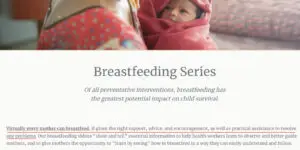Is Modern Day Breastfeeding Advocacy really feminist?
Breastfeeding advocacy is often characterized as feminist, and many people in the current breastfeeding advocacy community would describe themselves as feminists. Feminism, after all, is not just about demanding equality to men; it is about valuing women—our brains, bodies, and work—as much as we do men’s.[1] Breastfeeding and the provision of human milk is work, and many feminists—rightfully—expect that work to be valued.[2]
Modern breastfeeding advocacy started in the 1950s; La Leche League International (LLLI) began as a grassroots organization of women who wanted to breastfeed their babies and assist other interested mothers in doing so. Founders Marian Tompson and Mary White had experienced breastfeeding problems with their first children, leading to unwanted weaning; after successfully breastfeeding subsequent children and learning that many other mothers had been in the same position (bottle-feeding formula out of necessity rather than choice), they organized a group dedicated to helping others who wanted to breastfeed successfully.
They recruited Drs. Herbert Ratner and Gregory White to provide medical insight, so women could dialogue with their pediatricians, who at that time tended to expect babies to be fed with formula. They advocated for breastfeeding in public to support women to latch their babies as openly as a bottle-feeding mother.
While breastfeeding support is a human rights issue for women who wish to nurse their babies, and the founders of LLLI began to advocate for protecting that right, misogyny has been an undercurrent from the beginning and continues to this day.
Misogyny is defined as hatred of, contempt for, or prejudice against women. It is a form of sexism that keeps women at a lower social status than men, thus maintaining the societal roles of patriarchy. Some breastfeeding activists, who are highly respected in the lactation advocacy community, have revealed profoundly misogynist streaks.
La Leche League medical advisor Dr. Gregory White, for example, referred to bottle-feeding mothers as “handicapped,” also stating: [2]

Dr. Herbert Ratner, also an LLL medical advisor:[3]

Dr. Jack Newman, the author of The Ultimate Breastfeeding Book of Answers, has stated that:[4]

Other feminists have argued that while breastfeeding is a valid choice and should be fully supported by society, it is a choice, not an expectation or mandate. They emphasize that a woman is a person; her wants and needs are more important than what she is told to do with her breasts. They advocate for equality in all aspects of parenting, including feeding—sometimes going as far as to liken breastfeeding to enslavement. For example, French feminist Elisabeth Badinter has been sharply critical of what she views as the zealotry in modern motherhood recommendations, calling breastfeeding advocates “dictatorial,” “militants,” and “ayatollahs.” She characterizes breastfeeding in the way recommended by current health authorities (exclusively for six months, continuing for two years or beyond) as a threat to women’s autonomy, equality, careers, and relationships with their partners.
Some feminists, such as May Friedman, in her article “For Whom is Breast Best? Thoughts on Breastfeeding, Feminism and Ambivalence,” suggest a middle ground; Friedman’s article essentially boils down to listening and validating women’s feelings about breastfeeding, while agreeing it has benefits for babies:
“[B]reastfeeding must be taken up as a site of feminist activism, and must be viewed through the language of choice, acknowledging the tremendous physical and emotional impact on mothers, rather than simply looking at the benefits for their babies.”
She also points out the impossible position society puts breastfeeding women in:
“Before I had [my] baby, I was already vaguely concerned about the aggressiveness of marketing campaigns around breastfeeding, as well as the strange contradictions between the fervency with which breast was presented as best and the outright hostility to breastfeeding [our emphasis] that I perceived the rest of the time.”
Though purporting to support women’s choices, breastfeeding education, policies, and recommendations in the US and many other countries have become increasingly coercive. Mothers are being dehumanized, infantilized, and gaslighted, which we will delve into in this series of articles.
Examples:
- A mother’s needs for sleep and recovery have been ignored to gain compliance for rooming-in policies (which are not necessary for breastfeeding success).
- Mothers are provided no informed consent about the risks of underfeeding while exclusively breastfeeding.
- Women who tell their health professionals that they don’t have enough milk are doubted and labeled as “perceiving insufficient milk.” Even when their infants are rehospitalized for dehydration or suboptimal feeding jaundice,
- A mother’s “lack of education,” experience, or technique is blamed rather than the known physical phenomenon of low milk supply.
- In some cases, mothers have even been assaulted—reporting their breasts being touched without their consent, sometimes aggressively.
- The disparagement of women who use formula is not only contemptuous of women as valuable beyond what they do with their breasts, it is ableist, misogynist, homophobic, transphobic, and deeply offensive to fathers, partners, and adoptive and foster parents.
DO THE ENDS JUSTIFY THE MEANS?
Some people would argue that infant nutrition and the purported superiority of mother-infant bonding from breastfeeding are important enough to justify a little arm-twisting. Yet breastfeeding advocacy in its current form has actually increased cases of infant undernutrition—sometimes to the point of requiring hospitalization [6]—as they have overestimated how many mothers have the milk supply to breastfeed exclusively.

Source: Global Health Media, an organization that partners with LLLI, the CDC, Unicef, the AAP, the NHS, and the pharmaceutical company Merck to make educational videos for parents and health care providers.
A summary of the current science and a study of 143,889 infants found that:
- “[Infants] who are exclusively breastfed are more likely to be hospitalized compared to formula-fed or mixed-fed infants, due to hyperbilirubinemia, dehydration, hypernatremia, and weight loss (number needed to harm (NNH) = 71). For weight loss >10% of birth weight with or without hospitalization, the NNH for breastfed infants is 13.32.”[6]
- “Late preterm infants who are exclusively breastfed are nearly twice as likely to be hospitalized as a breastfed term or non-breastfed preterm infants, primarily due to dehydration, failure to thrive, weight loss, and hyperbilirubinemia.”[7]
These are facts acknowledged—yet rarely disclosed to parents—by the AAP and Academy of Breastfeeding Medicine.
It is clear to us that the current state of breastfeeding advocacy is not about what’s best for babies; it’s about controlling women.
[Part 2 of 4 to follow.]
Lynnette Hafken, MA, IBCLC; Christie del Castillo-Hegyi, MD; Jody Segrave-Daly, RN, IBCLC–retired.
[1] We recognize and honor all parents and caregivers who feed babies, whether they bottle-feed, tube feed, breastfeed or chestfeed, with human milk or formula or both. Any person with mammary tissue can lactate, and any person with nipples can breastfeed or chestfeed with a supplemental nursing system. “Fed is best” is inherently inclusive of any person who feeds a baby. Gendered terms are used in this article to reflect their historical use, and for simplicity; they should not be construed as exclusive of any gender identity.
[2] Breastfeeding and feminism: A focus on reproductive health, rights and justice
[3] Weiner, L. Y. (1994). Reconstructing Motherhood: The La Leche League in Postwar America. The Journal of American History, 80(4), p. 1368. doi:10.2307/2080604
[4] It’s Time for Feminists to Stop Arguing About Breastfeeding and Fight for Better Formula
[5] Since the time of Eve : La Leche League and communities of mothers throughout history.

One thought on “How Do Misogyny and Feminism Impact the Breast is Best Narrative?”